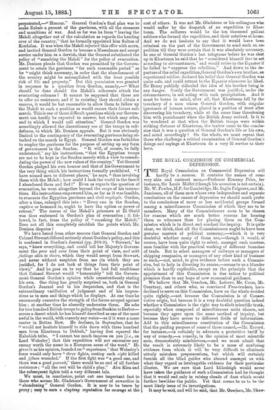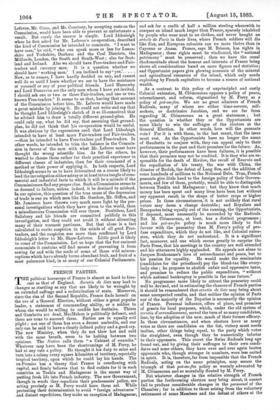THE ROYAL COMMISSION ON COMMERCIAL DEPRESSION.
TRE Royal Commission on Commercial Depression will hardly be a, success. It contains the names of some very able and eminent men,—Professor Bonamy Price, for instance, Sir Louis Mallet (though his accession is not certain), Mr. W. Fowler, M.P. for Cambridge, Mr. Inglis Palgrave, and Mr. Jamieson, all of them men whose own independent and separate conclusions on the causes of depression we should much prefer to the conclusions of more or less accidental groups formed among a miscellaneous Commission of which they are to be members. Many of the Commissioners seem to be chosen for reasons which are much better reasons for hearing them as witnesses than for placing them an the Com- mission which is to direct and conduct the inquiry. It is quite clear, we think, that all the Commissioners ought to have been genuine masters of political economy,—which it is very doubtful whether many of them are,—though it would, of course, have been quite right to select, amongst such masters, men familiar with the practical working of different branches of trade. But to select managers of railways or managers of shipping companies, or managers of any other kind of business as such,—not, mind, to give evidence before such a Commis- sion, but to help in directing its course,—seems to us a blunder which is hardly explicable, except on the principle that the appointment of this Commission is due rather to political promises than to any hope of new economical guidance. We believe that Mr. Goschen, Mr. Lefevre, Mr. Cross, Mr. Courtney, and others who, as convinced Free-traders; have declined to serve on this Commission, have on the whole decided quite rightly,—not because the Commission is of Conser- vative origin, but because it is a very doubtful question indeed whether a Commission is the right way to elicit scientific truth, especially when composed of miscellaneous units chosen,.not because they agree upon the same method of inquiry, but because they have access to different fields of information. Add to this miscellaneous constitution of the Commission that the guiding purpose of some of those named,—Mr. Ecroyd, for instance,—is certainly to advocate a protective tariff by way of remedy,—a remedy, in the opinion of most scientific men, demonstrably mischievous,—and we must admit' that the result is extremely likely to be a mass of confusing evidence from which it will be very difficult to eliminate utterly mistaken prepossessions, but which will certainly furnish all' the blind guides who abound amongst us with what they regard as irrefragable evidence for their particular illusion. We are sure that Lord Iddesleigh would never have taken the gaidance of such a Commission had he thought that it would end only in raising clouds of dust which' would farther bewilder the public. Yet that, seems to us to be the most likely issue of its investigations. It may be said, and.ill be said, that Mr. Goschen, Mr. Slaw-
Lefevre, Mr. Cross, and Mr. Courtney, by accepting seats on the Commission, would have been able to prevent so unfortunate a result. But surely the answer is simple. Lord Iddesleigh when he first asked for Mr. Lefevre's co-operation, described the kind of Commission he intended to nominate. " I want to have men," he said, " who can speak more or less for Lanca- shire and Yorkshire, Durham and the Coal Districts, the Midlands, London, the South and South-West ; also for Scot- land and Ireland. Also we should have Free-traders and Fair- traders and currency men. It is a question whether we
should have ' working men.' I am inclined to say' yes.' Now, as to names, I have hardly decided on any, and cannot well do so until I learn whether we are to have the assistance of yourself or any of your political friends. Lord Harrowby and Lord Dunraven are the only men whom I have yet invited. I should ask one or two or three Fair-traders, and one or two known Free-traders." It seems to us that, having that account of the Commission before him, Mr. Lefevre would have made a great mistake by joining it. He could not write and say that he thought Lord Iddesleigh's sketch of it so ill-conceived that he advised him to draw a totally different ground-plan. He could only say, what he did say, that assuming that ground- plan, he did not think that his co-operation would be useful. It was obvious by the expressions used that Lord Iddesleigh intended to have at least more Fair-traders quil Fair-traders, —than he intended to have Free-traders qud Free-traders. In other words, he intended to trim the balance in the Commis- sion in favour of the men with what Mr. Lefevre must have thought the wrong scientific bias. As for the others, he wanted to choose them rather for their practical experience in different classes of industries, than for their command of a method or their power of applying it. In both respects, Lord Iddesleigh seems to us to have determined on a course likely to lead the investigation either astray or at least into a tangle of com- mercial and industrial facts to which it will be a miracle if the Commissioners find any proper clue. Such a Commission seems to us doomed to failure, unless, indeed, it be destined to mislead. In our opinion, this question of the true cause of the depression of trade is one on which men like Mr. Goschen, Mr. Giffen, and Mr. Jamieson have thrown very much more light by the per- sonal investigations which they have given to the world, than a miscellaneous Commission will ever throw. Doubtless, Lord Salisbury and his friends are committed publicly to this investigation, and they could not avoid it without alienating many of their warmest partisans. But that alone is a fact calculated to excite suspicion in the minds of all good Free- traders, and the suspicion was more than confirmed by Lord Iddesleigh's letter to Mr. Shaw-Lefevre. Little good is likely to come of the Commission. Let us hope that the few eminent economists it contains will find means of preventing it from sowing far and wide the seeds of some of those wild miscon- ceptions which have already borne abundant fruit, and fruit of a most poisonous kind, in so many of our Colonial Parliaments.



































 Previous page
Previous page